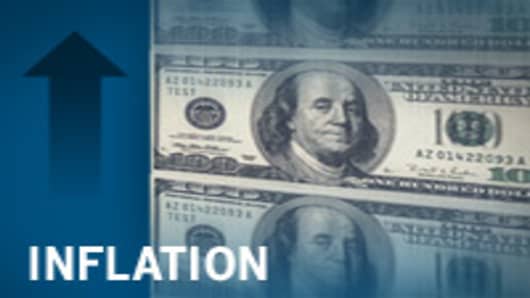Fed officials have turned up the volume on inflation talk in the past week, and it comes as the more hawkish among them have become louder critics of the Fed's current easy money policies.
Pimco market strategist and portfolio manager Tony Crescenzi said Fed officials have changed their tone slightly to express a change in inflation expectations. He said Fed Chairman Ben Bernanke, in his semiannual testimony to Congress last month, used the word inflation 22 times, compared to nine times in his prepared remarks six months earlier.
"It seems that the Fed is trying to say, while the Fed itself is not concerned about headline inflation, it is concerned that the public is because it can affect inflation expectations, and inflation expectations can feed the enemy, inflation," Crescenzi said in an interview this week.
Crescenzi said he expects the Fed to complete its quantitative easing (QE2) program, but notes in its last statement it acknowledged the possibility of inflation while removing concerns about deflation.
"The Fed has shifted battlefields now because inflation expectations have moved up and the cost-benefit analysis on QE2 and this extraordinary accommodation has shifted a bit, whereas it was one-sided for a while and largely on the side of benefits. It still is, but there's a growing cost," Crescenzi said.
A parade of regional Fed presidents have spoken publicly in the past week on one side or the other of the Fed's current extraordinary easing policy. Some, like Chicago Fed President Charles Evans, said the quantitative easing program, under which the Fed plans to buy $600 billion in Treasury securities, should continue as scheduled. But St. Louis Fed President James Bullard questioned whether the Fed could cut short the purchases, which are now expected to continue until June, and Richmond Fed President Jeffery Lacker said he could see the Fed raising rates by year end.
Minneapolis Fed President Narayana Kocherlakota said that QE has boosted inflation expectations more than he anticipated and that higher short-term rates are possible in late 2011. Economists have been expecting the Fed to end its easing program in June and leave near-zero interest rates unchanged until some time in 2012.
The Fed's easy monetary policy has been blamed in part for the weakening dollar and run-up in commodities prices around the globe.
"I don't think it's a concerted, coordinated effort to change the messaging. I think these various Fed presidents are expressing their views. I think the feeling is they're going to be a more open Fed and they're going to be a little more transparent. I don't think there is some Fed policy here that's changing, and they're trying to express that," said Mark Zandi, chief economist at Moody's Economy.com.
The Fed also announced just before the latest round of Fed speak that it would hold media briefings after FOMC meetings four times a year. The first is on April 27, and some economists have expressed concern about the event, expecting it to add volatility to markets.
As some of the more hawkish Fed officials begin to speak about inflation, economists are also watching the employment rate to see if it, too, could get the Fed moving sooner rather than later to end its easy policies.
The unemployment rate, in Friday's March jobs report, fell faster than expected to 8.8 percent. If it continues to decline, economists say the Fed may shift its efforts to the other twin of its mandate — fighting inflation.
New York Fed President William Dudley said the Fed is nowhere near succeeding on the employment front or price stability, for that matter. "We are still very far away from achieving our dual mandate of maximum sustainable employment and price stability," Dudley said in a speech Friday. "Faster progress towards these objectives would be very welcome."
Questions? Comments? Email us at marketinsider@cnbc.com



